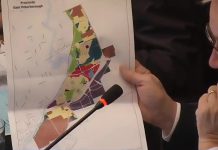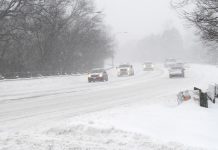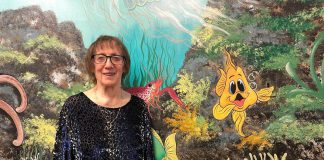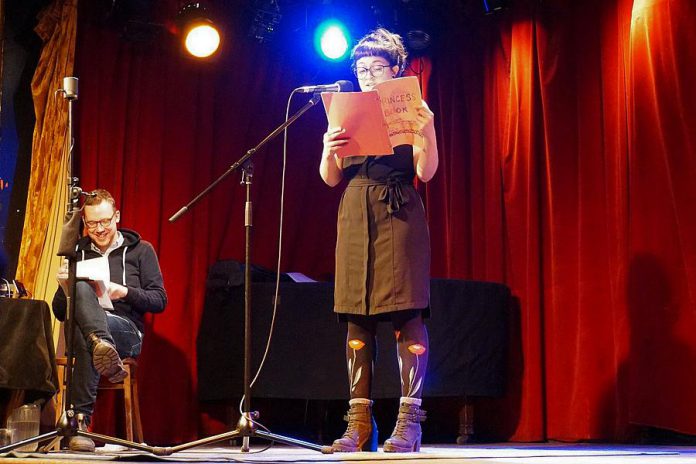
While it’s widely heralded that a picture is worth a thousand words, Dan Misener is here to tell us words can paint a picture that’s equal parts revealing, liberating, and powerful — and sometimes quite funny.
Since 2007, live storytelling event Grownups Read Things They Wrote As Kids, which Misener created, hosts, and co-produces with his wife Jenna, has provided an inspiring forum for Canadians to publicly share the thoughts they committed to paper long ago as children and teenagers — short stories, diary entries, letters, and the like.
At 8 p.m. on Sunday, September 17th at the Market Hall Performing Arts Centre (140 Charlotte Street, Peterborough, 705-749-1146), Misener’s show will be staged in Peterborough for the first time.
Admission is free for those who register in advance to read, but that opportunity is presented on a first-come first-served basis. Audience tickets are $13+HST.
To sign up as a reader or to purchase audience tickets, visit grownupsreadthingstheywroteaskids.com/events/#Peterborough.
“I am consistently surprised at the generosity of the people who sign up to read,” says Misener who, in late 2006 while visiting Jenna’s parents in Kingsville Ontario, stumbled across her diary written in her early teens.
VIDEO: “I’m pretty sure I missed his lips” – Grownups Read Things They Wrote as Kids
According to Misener, the pair spent the better part of the afternoon reading the entries aloud to each other, laughing and crying. After his own mom sent him some of his schoolwork, Misener booked the Victory Café in Toronto, invited friends, and unwittingly launched what became Grownups Read Things They Wrote As Kids.
“When you dig through your own childhood or teenage writing, it can be a lovely personal experience,” Misener says, “but to get up on stage and share a bit of yourself, that takes guts.
“That’s the part that I’m always surprised at. Not that people have this stuff, but that they are so giving and so open with largely a roomful of strangers.”
According to Misener, those wanting to sharing their written work must meet three criteria: you have to be the one who wrote it, as a kid or adolescent; you have to be one who reads it, as an adult; and it must take five minutes or less to read. Other than those stipulations, the content can be whatever the reader wants to share.
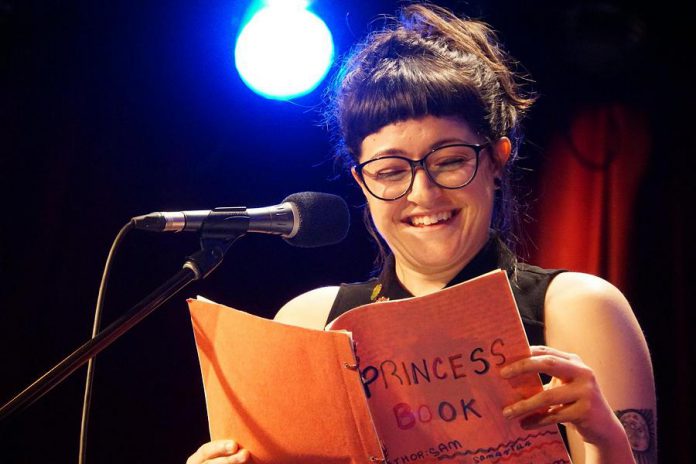
“We’ve had people come and read who are in their twenties and in their nineties and everybody in between,” Misener explains. “We get lots of different types of readers from all kinds of different backgrounds.
“We also get a really wide range of formats. We hear a lot of diaries, a lot of journals, a lot of poetry; we hear schoolwork but we also get to hear less common formats — correspondence or plays or song lyrics and so on.
“The thing that always strikes me is how we also get this wide range of emotions. A lot of what we hear is cute or weird or funny, and some of it is not funny at all. We’ve had people get onstage and be very candid and very open and very personal about really difficult things in their lives growing up.
“We’ve had people talk about domestic abuse, eating disorders, and lots of really difficult things. That’s really what we’re going for. We want to be, as much as we can, a broad representation of what it is to grow up across the country. A lot of that is fun but not all of it.”
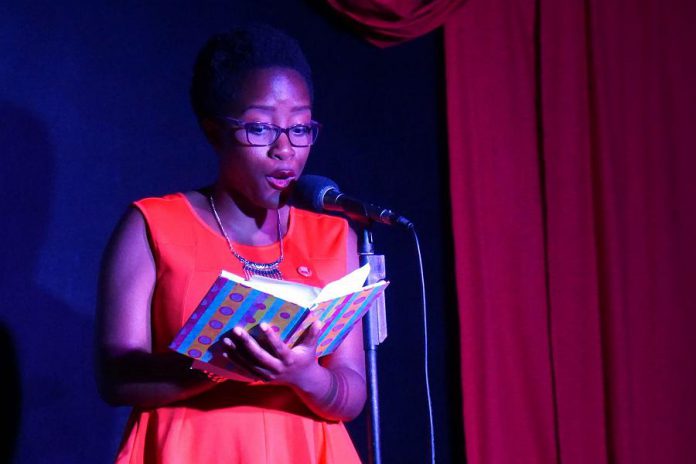
Faithful listeners of CBC Radio back in 2014 will already be familiar with Grown Ups Read Things They Wrote As Kids. In the summer of that year, Misener and CBC colleague Alison Broverman toured the country, held live shows, and taped them for airing on the network. In total, 10 episodes were aired.
When CBC opted to not renew the show, Dan and Jenna launched an independent podcast — a return to the original format when the couple first launched the show in 2008 and aired 18 episodes that year. Currently, new episodes are available every couple of weeks, available on iTunes, Google Play, Spotify, RadioPublic, SoundCloud, Overcast, Stitcher, Pocket Casts, TuneIn and anywhere else using RSS.

Those looking for any bitterness on Misener’s part in regards to CBC not renewing the show can keep looking.
“The partnership with the CBC was really great,” he recalls. “It has such a broad audience across this country. Of course it was disappointing that our run ended, but the great thing is we live in a time where podcasts exist and you don’t need a broadcast tower to have a show.
“We certainly wouldn’t be where we are today in terms of the audience of the show, or the amount of awareness of the show, without being on CBC.”
Crediting “the amateur archival work of parents” for the abundance of material people have to share, Misener says both the podcast and the live shows see people share writing with universal themes.
“Unrequited love is a pretty common theme no matter where you grew up or who you are. Fighting with your parents, fighting with your siblings, having a teacher you really loved or a teacher you really hated — these kinds of things cut across age and culture.
“We did a show a couple of years ago in Vancouver. We had two readers back to back: a woman who read her teenage diary written in the 1960s and a woman who read her teenage diary written in the 1990s. They were separated by a generation and a half but they could have swapped diaries and you wouldn’t have known the difference.”
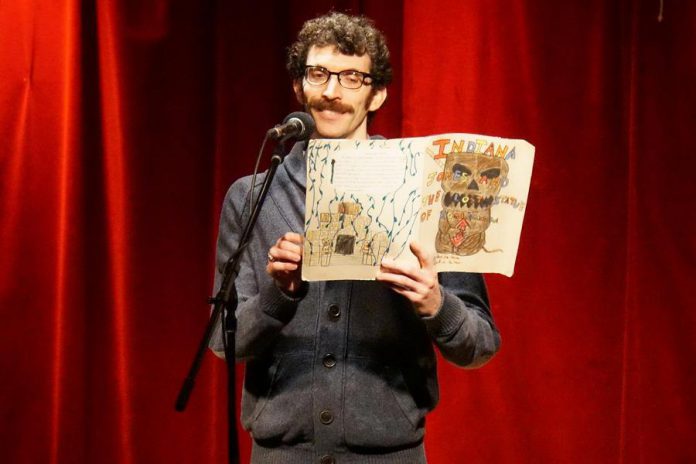
While a steady stream of people sharing their writing is vital to the success of each live show, Misener says the audience “is the punctuation mark” and, as such, plays a huge part in each event.
“The act of taking something that was once very private and making it public is, in itself, really the core of our show. We have some of the warmest, most supportive audiences I have ever seen. At our live shows, people laugh but it’s not a comedy show where you have to win people over. Everyone in the audience has already been won over.”
On a personal level, Misener says the reward of Grownups Read Things They Wrote As Kids lies in his interactions with readers prior to each live show.
“We’ve heard so many lovely stories where people thought they had lost their writing and then it appeared in a serendipitous kind of way, or they reconnected with a family member who they had sent a letter to years ago and it managed to find its way back into their hands.
“All these great examples of reconnection with the past, that’s really the hope that I have for anyone who listens to the podcast or comes to a live show … that they have some small moment of reflection about themselves and who they are today and who they used to be.”
AUDIO: Episode 314 – “You stole my electron” (Regina)
Noting that Market Hall was “highly recommended by a number of people who know Peterborough well”, Misener is excited to bring the live show to the city for the first time.
“One of the great joys of getting to do this show is traveling and meeting people. For a place where we’ve not been before, not only do we get this huge backlog of material that hasn’t surfaced but we also get to meet a bunch of people that we haven’t met before.
“That’s really what I look forward to. The first time we do a show anywhere is always special. The hope is we choose places to go where people are willing to do a little bit of digging and find their own material. That’s the only way the show works.”
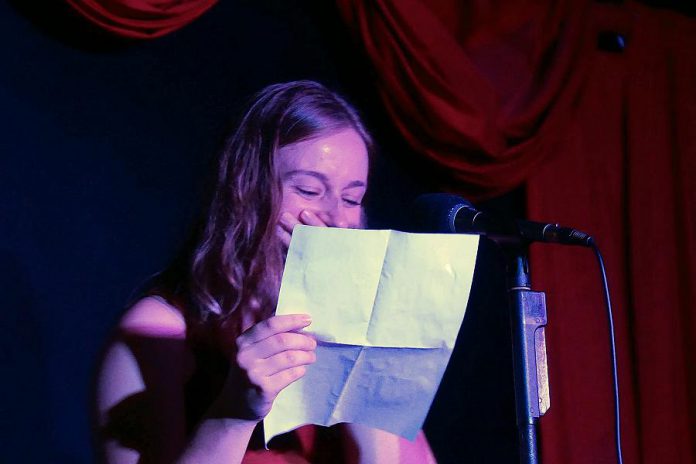
Cognizant of the fact that most people are nervous over the prospect of getting on stage and sharing their words, Misener makes it a habit of going first to help break the ice and put participants more at ease.
“I would be a hypocrite if I was asking people to do something that I wasn’t myself willing to do,” he says. “So at every show I read a little something that I wrote when I was a kid and Jenna reads some of her childhood and teenage writing.”
Noting “childhood writing is not a renewable resource”, Misener says he and Jenna will keep doing the show “as long as people have material to read. Culturally, I think we’re going to be writing our thoughts and feelings down, whether that’s on paper or digitally, for a very long time to come.”
For more information on Grownups Read Things They Wrote As Kids and to listen to past episodes, visit grownupsreadthingstheywroteaskids.com.


